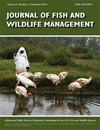Effects of Training on Side-Scan Sonar Use as a Fish Survey Tool: a Case Study in Alligator Gar
IF 0.9
4区 环境科学与生态学
Q4 BIODIVERSITY CONSERVATION
引用次数: 0
Abstract
Consumer-grade side-scan sonar has become a versatile fisheries management tool. First applied to assess habitat, its use has expanded to surveying fishes in recent years. However, an important consideration is the skill and experience of users, which can impact both the accuracy and comparability of surveys. To this end, we characterized the ability of a small sample of novice users (N = 8) to identify alligator gar Atractosteus spatula in imagery, as well as the effect of a two-hour training exercise on user performance. Prior to training, mean accuracy (expressed as the difference between observed and expected counts) among participants ranged from -2.6 to 1.3 fish and precision ranged from ± 1.2 to 2.4 fish, with the majority of participants underestimating the number of alligator gar present in the imagery. False positives (i.e., identifying alligator gar in imagery when none were present) were common among participants. Post-training mean accuracy ranged from -3.1 to 0 among participants and precision ranged from ± 1.6 to 3.2 fish. The frequency of false positives was significantly reduced following training, and participants reported significant increases in confidence associated with image interpretation. The relatively high accuracy and precision we observed prior to training indicated that side-scan sonar can be easily incorporated into large-scale fishery monitoring efforts for alligator gar. However, our results also suggested that a rather minimal investment in training can further improve consistency and reduce uncertainty among novice users.训练对侧扫声纳用作鱼类调查工具的影响——以扬子鳄为例
消费级侧扫声纳已成为一种通用的渔业管理工具。它最初用于评估栖息地,近年来已扩展到调查鱼类。然而,一个重要的考虑因素是用户的技能和经验,这可能影响调查的准确性和可比性。为此,我们描述了一小部分新手用户(N=8)在图像中识别短吻鳄gar Atractosteus抹刀的能力,以及两小时的训练对用户表现的影响。在训练之前,参与者的平均准确度(表示为观察到的数量和预期数量之间的差异)在-2.6至1.3条鱼之间,准确度在±1.2至2.4条鱼之间,大多数参与者低估了图像中鳄鱼的数量。假阳性(即在图像中没有鳄鱼的情况下识别鳄鱼)在参与者中很常见。参与者训练后的平均准确度在-3.1到0之间,准确度在±1.6到3.2条鱼之间。训练后,假阳性的频率显著降低,参与者报告与图像解释相关的置信度显著提高。我们在训练前观察到的相对较高的精度和精度表明,侧扫声纳可以很容易地纳入鳄鱼的大规模渔业监测工作中。然而,我们的研究结果也表明,在培训方面投入最少可以进一步提高一致性,减少新手用户的不确定性。
本文章由计算机程序翻译,如有差异,请以英文原文为准。
求助全文
约1分钟内获得全文
求助全文
来源期刊

Journal of Fish and Wildlife Management
BIODIVERSITY CONSERVATION-ECOLOGY
CiteScore
1.60
自引率
0.00%
发文量
43
审稿时长
>12 weeks
期刊介绍:
Journal of Fish and Wildlife Management encourages submission of original, high quality, English-language scientific papers on the practical application and integration of science to conservation and management of native North American fish, wildlife, plants and their habitats in the following categories: Articles, Notes, Surveys and Issues and Perspectives. Papers that do not relate directly to native North American fish, wildlife plants or their habitats may be considered if they highlight species that are closely related to, or conservation issues that are germane to, those in North America.
 求助内容:
求助内容: 应助结果提醒方式:
应助结果提醒方式:


